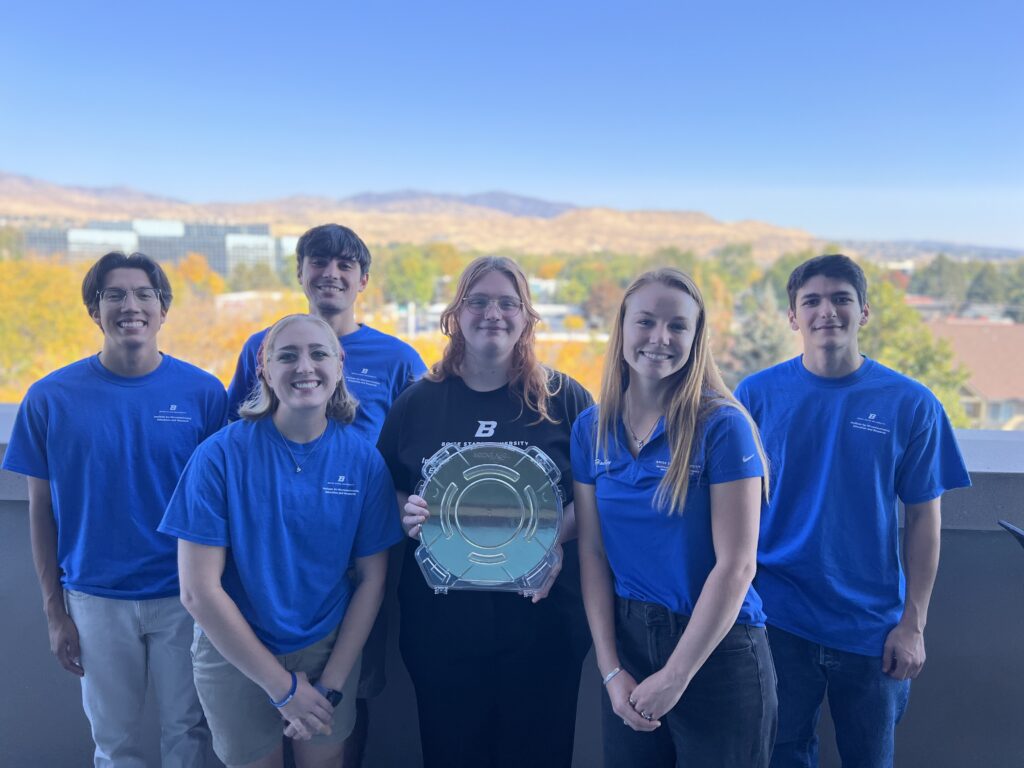
It is often said that teaching a subject demonstrates true mastery of it. This is evident at Boise State’s Institute for Microelectronics Education and Research (MER), where five undergraduate students were recently hired to lead educational outreach in local schools and the surrounding community.
These students, known as Chip Ambassadors, will visit K-12 classrooms across the valley to deliver lessons on semiconductors and microelectronics. There is a growing demand for semiconductor education in Idaho and across the nation, and it is Boise State students that will be providing this instruction. Each Chip Ambassador, with their passion for STEM and accessible learning for all students, is a perfect fit for the role. Their areas of study at Boise State range from engineering to physics, with many also pursuing degrees and certificates in secondary education.
Jonathan Ambriz, a junior in Electrical Engineering and working towards a STEM secondary education certificate, was the first to join MER as a Chip Ambassador. A graduate of Kuna High School, Ambriz has distinguished himself academically, earning multiple scholarships and participating in the Society of Hispanic Professional Engineers and award-winning robotics projects. Balancing coursework, part-time jobs, and his commitment to outreach, he embodies the program’s mission. He aspires to one day become a teacher where he can continue to work with and motivate students.
“I was interested in becoming a Chip Ambassador because of the opportunity to create and give out lessons in things I am interested in” Ambriz shared. “I love working with students and showing them that they can do anything.”

Dr. Kurtis Cantley, Associate Professor in Electrical and Computer Engineering, who has worked closely with Ambriz as a research assistant, spoke to the value these students bring. “While Jonathan certainly excels academically, he also has an incredible talent for communicating how electronics work that motivates young students.”
Ambriz’ skills and background are reflective of the entire Chip Ambassador team. The students’ academic success speaks to their hard work and intelligence, while their varied interests make them a diverse and dynamic group. The other Chip Ambassadors include Chandler Beasley, a junior in Physics with an emphasis in Astrophysics and Secondary Education; Hailey Featherston, a Senior in Science in Mathematics and Secondary Education; Daniel McConnell, a Sophomore in Mechanical Engineering; and Camden Webster, a Junior in Electrical Engineering with an emphasis in Renewable Energy and Semiconductors.
“This amazing group of students will have the opportunity to make tremendous impacts on the lives of thousands of students they will interact with” Cantley said of the ambassadors.
The Chip Ambassadors began their outreach in October, guided by adaptable and age-appropriate lessons developed by Hailey Lynch, the MER Institute’s Education and Outreach Specialist. Elementary students are introduced to the basics of circuitry, semiconductors, and microchips, while middle and high school lessons will delve into more complex topics, encouraging students to think about how this knowledge can shape their future careers. The outreach aims to introduce students to educational and career opportunities in the semiconductor industry, a key objective of the MER Institute.
The Chip Ambassadors and their work is funded by the Semiconductor for All grant, a $10 million initiative aimed at establishing semiconductor education in the state of Idaho. The effort began with the CHIPS and Science Act of 2022, which seeks to grow manufacturing and a future workforce in the semiconductor industry across the country.
This is just one more way that Boise State is on the cutting-edge of global industries. It is today’s Boise State students that are educating the future of the semiconductor workforce.
“Microelectronics and semiconductors are a huge part of our lives, and their impact is only going to get bigger,” said Ambriz. “I hope that the students find out just how cool microelectronics are and can get a career doing something they are passionate about.”